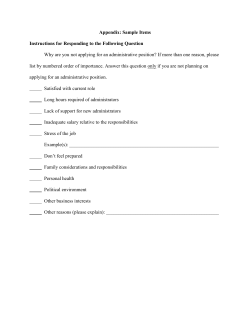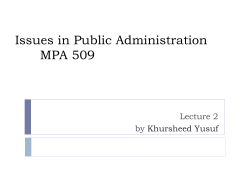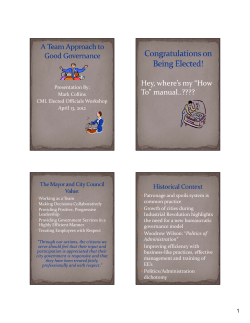
FUNDAMENTALS: Governance, Policy, and Management What Is Public Management or
FUNDAMENTALS: Governance, Policy, and Management What Is Public Management or Administration? I. What is Public Administration? II. Why is Public Administration Difficult to Define? III. Public Administrators A. Who Are They? B. What Do They Do? C. What Should They Know? IV. Public Administration and Business A. How is PA Similar to Business? B. How is PA Different From Business? V. What are the Key Issues in Public Administration Theory and Practice? VI. What are the Big Questions? A. Behn B. Kirlin I. What is Public Administration? Denhardt: Public Administration is concerned with the management of public programs Wilson: Public Administration is the detailed and systematic execution of public law (administrative study is to discover first what government can properly and successfully do, and how it can do these proper things with the utmost possible efficiency and the least possible cost either of money or of energy) Wilson, continued Administration is a field of business Administration lies outside the proper sphere of politics Administration must be at all points sensitive to public opinion Do you see any problems with any of the above statements? I. What is Public Administration? Fesler and Kettl: Public Administration includes the shaping of policy on the way up, execution of policy after it has been made, and as a necessary part of the execution, decision making about policy matters on the way down Simon et al: In its broadest sense, administration can be defined as the activities of groups cooperating to accomplish common goals. I. What is Public Administration? Dimock and Dimock: In simple terms, administration is securing cooperation in order to get the work of the world accomplished . . .As a career, administration is an exciting challenge, for it calls on many aspects of a man’s nature and abilities and applies them to sticky social problems. Starling: Public Administration is the process by which resources are marshaled and then used to cope with the problems facing a political community I. What is Public Administration? Milakovich and Gordon: Public Administration may be defined as all processes, organizations, and individuals acting in official positions and roles associated with carrying out laws and other rules adopted or issued by legislatures, executives, and courts (many activities are also concerned with formulations of these rules). PA is also a field of academic and community study and professional training leading to public service careers at all levels of government. Which of these definitions best captures your personal definition of PA? Which of these definitions do you feel is the most valuable in promoting the field of PA? II. Why is Public Administration Difficult to Define? Rosenbloom: Central problem of Public Administration theory is that is derived from 3 distinct approaches of what PA is and each emphasizes different values, organizational structure, and views of individuals Rosenbloom, continued Managerial (what PA ought to be)-grew out of civil service reforms; PA was to be geared toward the maximization of effectiveness, efficiency and economy efficiency-most important value structure-hierarchical, functional specialization, jobs merit based, politically neutral competence; individual-impersonal view, individual worker is turned into an appendage, to a mechanical means of production Rosenbloom, continued Political (what PA was in practice)-PA is a problem in political theory, the fundamental problem in a democracy is responsibility to popular control; the responsibility and responsiveness of the administrative agencies and the bureaucracies to the elected officials is of central importance in a government based increasingly on the exercise of discretionary power by the agencies of administration; responsiveness, representativeness, and accountability through elected officials to the citizenry are key values structure-advantages of pluralism; enable faction to compete against faction; political participation by a variety of interested parties individual-viewed as part of an aggregate group Rosenbloom, continued Legal-administrative law, judicalization of PA, and constitutional laws are three components procedural due process, individual substantive rights, equity are key values structure-designed to facilitate the use of adversarial procedure; independence of hearing officer critical; individual-viewed as a unique person in a unique set of circumstances Rosenbloom, continued The three approaches cannot be synthesized because they are an integral part of a political culture that emphasizes the separation of powers rather than integrated political action; each associated with a different branch of government: managerial (executive) implementation of rules; political (legislative) making rules representativeness; legal (judicial) questions concerning application/execution of rules Peters—Models of Governance Market Models Participatory State Flexible Government Deregulating Government – Structure – Management – Policy Making – Public Interest III. Public Administrators – A. Who Are They? PAs of the future: – operate in a world shaped by high public expectations, – public-private and intergovernmental collaboration, – technological complexity, – cultural diversity, – feel of home, – not government bureaucracy, III. Public Administrators --A. Who Are They continued – – – – – encouraging interaction between employees, no excessive staff, immediate products, cutting red tape, quick service delivery: variety, fragmentation, and brevity – information age: quality and innovation are chief goals; need ability to synthesize the data in order to make effective decisions; have to be team players Which of these factors are you most concerned about as you become an administrator? III. Public Administrators B. What Do They Do? Interpersonal—relationships with others – a. figurehead-handling ceremonial and symbolic activities – b. leader-relationships with subordinates, including motivation, communication, encouragement, and influence – c. liaison-development of information sources both inside and outside an organization – d. politician-active attempts to shape environment III. Public Administrators B. What Do They Do, continued Informational—managers as nerve center of the organization – e. monitor-seeking current information from many sources – f. disseminator-transmits current information to others, both inside and outside of the organization – g. spokesperson-official statement about the agency to people outside the organization III. Public Administrators B. What Do They Do, continued Decisional—information is only a means to an end-the decision – h. entrepreneur-initiation of change—willingness to scan broader environments for approaches that suit their objectives, not captives of sectoral conventions, carve out new and personal missions for their organization, they are opportunistic, taking advantage of available resources, willing to take risks, have a bias toward action – i. disturbance handler-resolving conflict-subordinates, departments, citizens III. Public Administrators B. What they do: Decisional, continued – j. resource allocator-decisions about how to allocate people, time, equipment, budget – k. negotiator-formal negotiations and informal bargaining – l. policy maker-all organizations have policies that are statements of goals and objectives Which of these areas are you most/least comfortable with? III. Public Administrators C. What Should They Know? They need to know the process by which public policies are conceived and implemented; and the political, institutional, and socio-technological setting in which this policy process takes place Political knowledge alone is not enough, they must also have political skills Need skills to analyze and interpret political, social, and economic trends Need skills to evaluate the consequences of administrative action, and skills to persuade and bargain What are some of the current political, social, or economic trends affecting administration? Levin—Management Matters Discovery is not enough Point decisions are not enough Freedom is only the end of the beginning IV. Public Administration and Business Why should you be able to discuss the similarities and/or differences between public administration and administration? IV. Public Administration and Business A. How is PA Similar to Business? Both sectors are concerned with issues of organization design, the allocation of resources and the management of people IV. Public Administration and Business B. How is PA Different From Business? Work in public organizations is distinguished by its pursuit of democratic values and this affects nearly everything done as a public manager. IV. Public Administration and Business B. How is PA Different From Business? Denhardt: – Ambiguity, pluralistic decision making, and visibility - all stem from pursuing public purposes – Responsibility in PA is blurred-different structures – Incentive to satisfy parties that provides the resources-different incentives – Public’s right to know what goes on/external forcesdifferent settings – Produce profits versus produce public gooddifferent purposes
© Copyright 2025





















